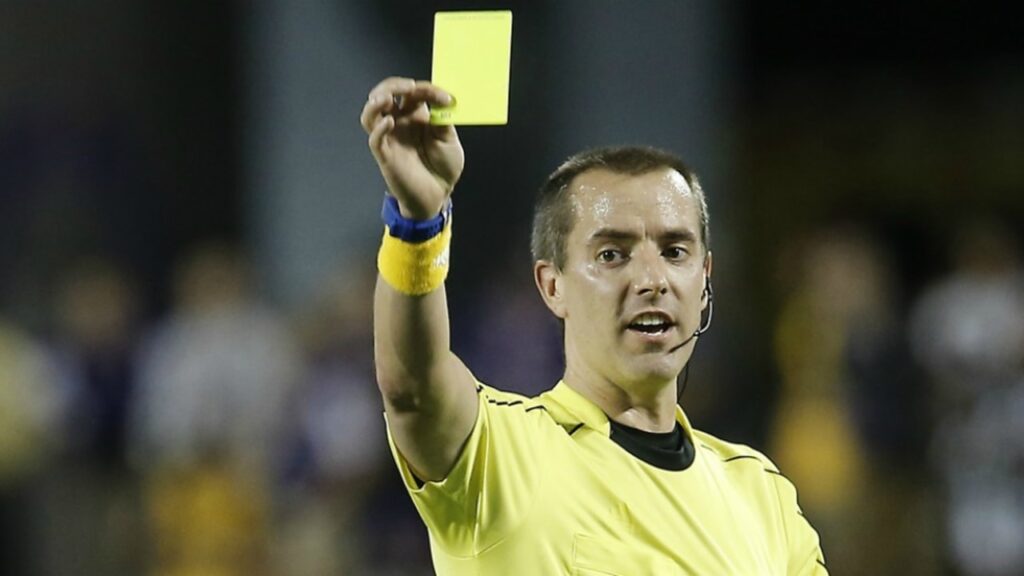An umpire and a referee both make sure games are fair, but they’re used in different sports. An umpire is mainly in sports like baseball or cricket, and they make decisions about the game’s rules directly on the field.
On the other hand, A referee found in sports like soccer or basketball, not only enforces rules but also manages player behavior and ensures fair play.
So, while both are game officials, their roles and the sports they’re associated with make them a bit different.
Who is the Umpire?
An umpire is like a rule boss in a game. They wear special clothes, usually with black and white stripes, so everyone can see them. Their job is to make sure players follow the rules and to decide if something is good or not in the game.
In some sports, they use whistles or flags to show what they decide. They are really good at the sport they work in, and they learn a lot about the rules. They need to be fast thinkers and always be fair. Being an umpire is hard work, but it’s cool because they get to be friends with the players and coaches and feel like part of the team.
Who is the Referee?

A referee is someone who oversees sports games to make sure everything is fair. They stay on the field or court with the players and make sure everyone follows the rules. Referees also look out for the safety of the players and decide when to stop the game or call fouls.
Furthermore, they know a lot about the sport they’re working in and have experience playing it. Good referees stay calm, even when things get intense, and fair decisions are based on clear facts. In short, they are super important in sports because they make sure everything is fair and in order.
Comparison Table: Umpire vs. Referee
| Parameters of Comparison | Umpire | Referee |
| Definition | An official ensuring rule enforcement and fair play | An official overseeing rule enforcement and maintaining game quality |
| Purpose of the Game | Settles player disputes | Ensures fair and legal gameplay |
| Sports | Cricket, baseball, tennis, Aussie rules football | Soccer, basketball, football, and team sports |
| Number | Varies (e.g., one umpire in American football) | Varies (e.g., one referee in American football) |
| Other Terms Used | Different roles (e.g., field umpires, boundary umpires) | Different names (e.g., linesman, timekeeper) |
| Responsibilities | Makes decisions on the field (e.g., out or not out) | Enforces rules, manages player behavior |
| Jurisdiction | Often limited to specific aspects (e.g., pitch conditions) | Oversees the entire match (e.g., player fouls) |
| Communication | Primarily uses hand signals | Interacts verbally, explains decisions |
| Training | In-depth knowledge of sports rules and certification | Extensive knowledge, certification, and experience |
| Notable Examples | Simon Taufel (Cricket), Dickie Bird (Cricket) | Pierluigi Collina (Soccer), and NBA referees |
Key Differences Between Umpire and Referee:

- Roles: Umpires make judgment calls, while referees enforce game rules.
- Responsibilities: Umpires decide plays; referees manage player behavior and ensure fair play.
- Communication: Umpires use hand signals; referees interact verbally.
- Training: Both need knowledge and certification, but specific requirements vary.
- Notable Examples: Different figures for cricket umpires and soccer referees.
Similarities:
- Both roles ensure neutrality and fair play.
- In some sports, both umpires and referees may coexist.
Challenges Faced:
- Both face pressure, criticism, and must maintain composure.
Training and Qualifications:
- Specific training and ongoing education are necessary for both roles.
Iconic Umpires and Referees:
- Figures like Simon Taufel and Pierluigi Collina set standards in their respective sports.
Evolution of the Roles:
- Technology (e.g., Hawkeye, VAR) has impacted decision-making in both umpiring and refereeing.
Umpire vs. Referee: A Comparison:
- Effective communication and cooperation are crucial, especially in overlapping roles (e.g., tennis).
Sportsmanship and Fair Play:
- Both roles play a vital role in promoting values of respect and integrity.
Technology’s Influence:
- Advances in technology have improved decision accuracy but raised debates about the “human element.”
Umpire and Referee Etiquette:
- Professionalism is paramount for maintaining the overall atmosphere of a match.
Career Prospects:
- Both umpiring and refereeing offer fulfilling careers with opportunities for advancement and recognition.
FAQ’s
1. What’s the difference between an umpire and a referee?
A referee oversees player conduct, ensuring fair play and rule adherence. An umpire not only enforces rules but also makes judgments affecting the game’s flow, such as determining if the ball crossed a critical region.
2. Why are referees called umpires?
The term “umpire” derives from Old French, meaning “one who is requested to act as an arbiter of a dispute between two people.”
3. What is the difference between referee and umpire in badminton?
The Referee oversees the entire tournament, ensuring fairness and adherence to rules. The Umpire manages individual matches within the tournament.
4. What is the role of the referee and the umpire?
Umpires, referees, and sports officials preside over athletic events, enforcing rules, detecting infractions, and deciding penalties.
5. Who is higher, umpire or referee?
In football, the referee is in charge of the entire officiating crew, making calls for penalties and overseeing the game.
6. What is the difference between a referee, umpire, and line judge?
In sports, “referee” and “umpire” are essentially the same; the term used depends on the sport. Line judges assign scores and may decide scoring-related issues.
7. Who is called an umpire?
An umpire is a person ensuring fair play in a sports match, making final decisions on rule adherence.
8. Is a football referee also an umpire?
No, Football officials have specific duties, with positions such as referee, umpire, head linesman, line judge, and others, each having distinct responsibilities.
9. What is it called, a referee?
A referee is a person with final authority in conducting a sports game, ensuring fair play and rule adherence.
Final Words
In conclusion, while both umpires and referees play crucial roles in sports, their primary distinctions lie in their areas of authority. Umpires focus on individual plays, rendering judgment calls in sports like cricket or baseball, whereas referees oversee the broader spectrum of the game, enforcing rules and ensuring fair play across the entire field or court, as seen in soccer or basketball.
In addition, the unique responsibilities of each position contribute to the smooth functioning and integrity of diverse sports, emphasizing the importance of these distinct roles in maintaining order and fairness in the world of athletics.

